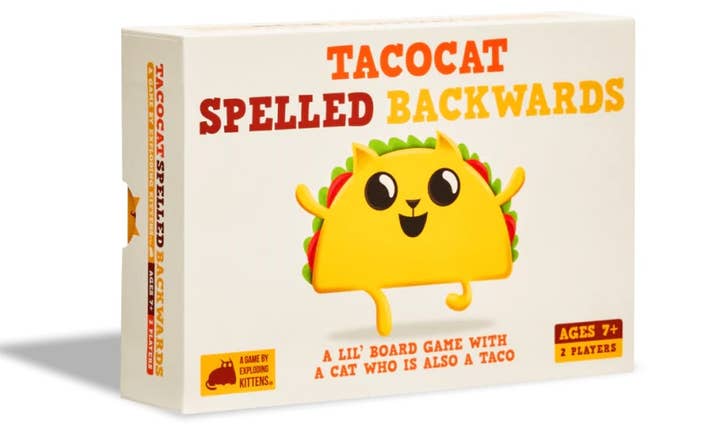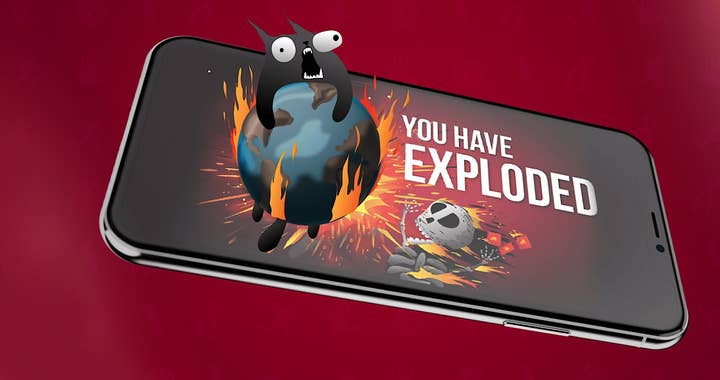Building an Exploding Kittens transmedia universe
Elan Lee talks about making a mobile game for Netflix and the company's ultimate aspirations
"My background is in video games," Exploding Kittens CEO and co-founder Elan Lee tells GamesIndustry.biz in a discussion at the Collision conference in Toronto. "And I -- with my partner Matt [Inman] -- started Exploding Kittens specifically to get away from that, to get away from the screen. Let's make eye contact. Let's entertain each other a little bit and use a card game as the mechanism to do that."
That game -- also called Exploding Kittens, coincidentally enough -- began as a record-setting Kickstarter campaign in January of 2015, raising $8.8 million from nearly 220,000 supporters.
The original Exploding Kittens proved to be a spark that spawned a variety of versions, expansions, and entirely separate games like Poetry for Neanderthals and Throw Throw Burrito. They've even taken the former Xbox Entertainment Studios chief design officer Lee back to video games, as the company released an Exploding Kittens premium mobile game and Kitty Letter, a free mobile game that combines established word find mechanics with the expected incendiary feline antics. But the video games were just the beginning.
"Now the strategy to build a brand is you take those characters that you've already put into people's homes and made them fall in love with, and you put them in other environments," he says. "You bring them to life, you go into the digital space, you make a bunch of video games. You make a bunch of TV shows. You hopefully eventually get into, like, theme park land, and you start to build a world around this franchise."
As an example, he points to Tacocat.
"What if Tacocat -- a very popular character in our card game -- had its own world," Lee asks. "What if we could start building video games around Tacocat, featuring just Tacocat from the Exploding Kittens universe? And the more we have the ability to take those characters, shine spotlights on them, and give them their own world to play in, the more we get to expand our brand and bring more joy to our audience."

So how does one create an Exploding Kittens Universe?
"In order for people to care and spend money on those, they have to know those characters and already be in love with them"
"You can't start there," Lee says. "That's impossible. In order for people to care and spend money on those, they have to know those characters and already be in love with them. The board game industry was a perfect entrée for us into that realm to get started with a much larger project, which we've just started now."
That project is an animated Netflix series in the works executive produced by King of the Hill co-creators Mike Judge and Greg Daniels and set to debut next year. The partnership with the streaming service also meant releasing a new mobile version of Exploding Kittens for free to Netflix subscribers, one with no ads or in-app purchases.
But Lee says it's not simply the old version of the game with the monetization stripped out. It has some new cards and various optimizations, but the end result is that there are now two distinct versions of Exploding Kittens available on mobile and for the moment at least, the company is supporting both.
"This is the tricky part when working with a somewhat secretive company. They don't release data back to us"
"We're trying to figure out how to give each its own personality," Lee says. "Right now there's confusion, you look at these and they're pretty similar. Our goal is that they need to live in different spaces and offer completely different gameplay. Now that the Netflix one is out the door, our focus goes back to the original to say, 'All those grand plans we had to make this different? It's time to hit go on those things.'"
Despite the possibility for confusion and cannibalization, Lee says the late May launch of the Netflix version of the game actually bumped up the metrics for the non-Netflix version. As for how the Netflix version is doing, Lee thinks it's going well.
"Netflix doesn't tell us the numbers for their other apps, so we don't have a measuring stick for this app yet," he says, adding, "This is the tricky part when working with a somewhat secretive company. They don't release data back to us. But the response we can measure -- audience participation, audience posting, community forums -- has just been far, far exceeding the original app."

Exploding Kittens can only read so much into how the Netflix version of the game performs right now because the reason for the game's existence was really that animated show coming down the line.
"Characters we introduce in the show will trickle into the game," Lee says. "You'll see characters introduced in the game make cameos in the Netflix show... It was so appealing to say, 'Netflix has an ecosystem and we're in a unique position unlike any other game company in the world, to actually take advantage of that system and build across it.'
Lee says the slogan at Exploding Kittens is, "We don't make entertaining games. We make games that make the people you're playing with entertaining." But if that's the secret sauce that makes Exploding Kittens' efforts in the gaming space, how is the company going to translate that to more linear media like TV and movies? Simply put, Lee says it's not.
"I don't want to get too creative with those other forms of media," Lee says. "Those work. We all really like sitting back, relaxing, binge-watching a bunch of shows in a row on TV. I don't think the answer is to say, 'That's broken; we're going to fix it.' I think the answer is to say, 'We've got this cool form of interactive media. You've played Exploding Kittens. Now we're going to take a bunch of those characters and put them into linear media, let you laugh, let you get deeper with them, let you understand those characters more. And now go back to the card game, because now you'll find more depth into it.'"
"We don't want to take like 60 years or 80 years like Lego, our goal is more like ten years. But as far as a playbook for how to do it, you could not have a better role model"
Transmedia pushes like this are nothing new, of course. Successful entertainment brands in one form of media have long eyed opportunities in other forms. So what has Lee learned from watching previous attempts to do with Exploding Kittens is attempting?
"The two we pay very close attention to are Lego and Marvel," Lee says. "They both had a similar strategy, which is, 'How do you produce something for really cheap for a start-up in the early days to get into people's homes and make them fall in love with the characters?' Simple toys, simple comic books. Do that for a bunch of years, and then once you hit a certain critical threshold, then you start expanding into larger properties to bring those characters to life. Those two companies have done it textbook, masterclass perfect. So we watched them very, very closely, analyzing the steps. We don't want to take like 60 years or 80 years like Lego, our goal is more like ten years. But as far as a playbook for how to do it, you could not have a better role model."
And what about the numerous other companies that had similar aspirations to grow a success in one field into a culture-spanning phenomenon, but fell far short? Lee says he's not worried about joining their ranks for two reasons.
First, "Our core brand is so strong that we feel it can endure a lot of experimentation on the other end."
And second, Lee says, "We believe very strongly that there's no such thing as success without failure. Everything about our company is tailored to trying a bunch of stuff as fast as possible, failing fast when we need to, failing when we need to, as long as its fast, so we can try more and more things, knowing that our core and our audience is strong enough that they'll play with us, accommodate a lot of experiments, and keep coming back because we're never breaking the core experience they've already fallen in love with."








